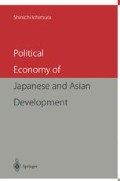Abstract
This chapter presents a summary of and reflection on the Japanese experiences with economic and social policies in postwar period and thereby tries to offer a frame of reference for examining and designing development policies in other countries. The success story of Japanese development is not just a demonstration of growth but offers a rich jewel box of policy instruments as well. The main purpose is, therefore, to explain the issues that Japan has faced and the policy measures that she has employed to resolve them. Japanese economic policies have been different from the policies of the United States and Europe in many ways. The latter more or less followed the standard textbooks or, in the case f the English Labor Party, the idea of the welfare state. But Japanese policies have been basically a search for the ways and means to change an underdeveloped economy into an industrial society comparable with those in the West. In this sense they are much more relevant to the policies in Asian and other developing countries. In Asian economies, the human factor played especially a noteworthy role in development In this respect too Japanese experiences seem to offer good precedents along with the weakness. After the discussion on policy problems, some remarks are added on the common features of Japanese and Asian development in two respects: (a) acceleration and deceleration of growth rate and (b) income distribution in Asian economies.
Access this chapter
Tax calculation will be finalised at checkout
Purchases are for personal use only
Preview
Unable to display preview. Download preview PDF.
References
Konishi, Sachio: “An Estimate of Tax Evasion in Thailand and Indonesia,” Paper presented at the convention of the East Asian Economic Association, Seoul. 1992.
See the articles of mine published in popular monthlies like Chuo-Koron and later included in my book, Shiren ni Tatsu Keizai Taikoku (Economic Power on Trial), Nihon Keizai Shinbun-sha, Tokyo, 1970. They are: 1. “From Metropolis to Megaropolis”, 2. “Urbanized society will decline”, 3. “Disperse the functions of Tokyo ”, 4. “Beautiful and efficient use of land.” These articles were written as criticisms on the Second Land Use Plan in 1969 but unfortunately the Japanese government moved the other way.
In the United States, the government is not necessarily involved, but many public-minded foundations and institutes undertake many long-term policies for the national development and better international relations. The contributions of such organizations as the Ford Foundation, the Rockefeller Foundation, the Council of Foreign Relations should receive the proper attention in the analyses of public policies of the United States.
See Ichimura, Ajia ni Nezuku Nihonteki Keiei (Japanese Style Management in Asia), Toyokeizai Shinpo-sha, Tokyo 1988, which shows on the basis of survey that the so-called Japanese style management is practiced in bigger corporations more widely than small and medium enterprises, and the difference is significant among enterprises. A brief English summary is available in “Management Styles of Japanese Multinational Corporations in China,” (with S. Ito, T. Tomita and S. Kusanagi), in East Asian Economic Perspectives, March, 1997, ICSEAD, Kitakyushu.
A recent useful document on this matter is, World Development Report- the State in a Changing World, 1997. Useful references are given in the report.
One should not take this fact as something that automatically accompanies economic growth in any country. For instance, in Latin America these ratios have not increased with the rise in per capita income, in some countries the saving ratios have stabilized at around 20%, and in others they are falling. Among the East Asian economies of our sample only the Philippines shows a savings behavior similar to that of Latin America. Except for Singapore and Taiwan, household saving rates for our sample reach a ceiling slightly below 30%, regardless of per capita income level. Significant though this is for the relative success of the growth strategies for all these countries, the effect of the disparities in per capita income level among our four types of economies is clearly reflected in the resource gap each has characteristically experienced and, consequently, in the extent to which each has had to borrow from abroad to sustain its rate of capital accumulation and growth in the recent past.
An excellent argument on these matters is presented in Harry Oshima, “Trends in Productivity Growth in the Economic Transition of Asia and Long-Term Prospects for the 1990’s,” The Asian Econmic Journal, Vol IX, no. 2, 1995. See also S. Ichimura, “Keizai-hatten Shohatsu no Joken,” (Conditions for Starting Economic Development), Kokumin Keizai Zasshi, Kobe University, 1997
This formulas was adapted with modifications from Karl Deutsch’s and Samuel Huntington’s formulas, which arc somewhat more complex (sec Deutsch 1961, Huntington 1968, Wcincr and Huntington 1987, Ichimura and Morlcy 1993.
Author information
Authors and Affiliations
Rights and permissions
Copyright information
© 1998 Springer Japan
About this chapter
Cite this chapter
Ichimura, S. (1998). Policies for Economic Development. In: Political Economy of Japanese and Asian Development. Springer, Tokyo. https://doi.org/10.1007/978-4-431-66962-3_8
Download citation
DOI: https://doi.org/10.1007/978-4-431-66962-3_8
Publisher Name: Springer, Tokyo
Print ISBN: 978-4-431-70227-6
Online ISBN: 978-4-431-66962-3
eBook Packages: Springer Book Archive

